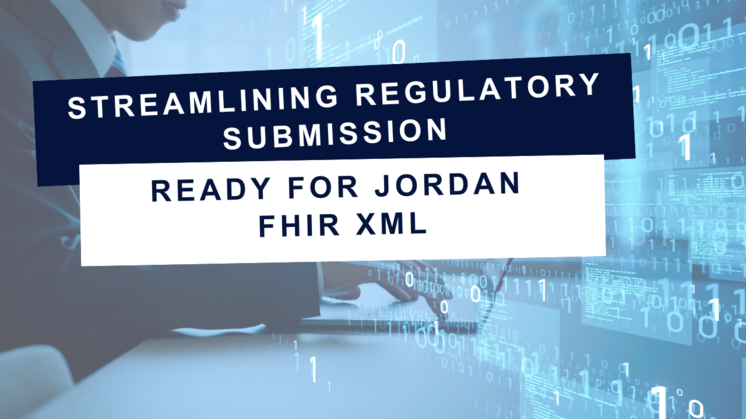
Streamlining Regulatory Submission- Ready for Jordan FHIR XML
In the world of regulated labeling documentation, compliance and precision are key. However, adapting to new regulatory guidelines can be challenging, especially if they are mandatory to get the market authorisation for a drug. In Jordan it is now mandated that ePI documents conform to the predefined technical specifications based on the FHIR standard which means that monolithic documents such as Word or PDF are no longer a viable option. While the portal offers the possibility to convert the contents of those documents manually, this process requires extensive reformatting and is both time-consuming and prone to human error. By automating this workflow, our solution helps to ensure the content integrity and speeds up the conversion process.

FHIR - The Underlying Standard
FHIR (Fast Healthcare Interoperability Resources) is an HL7 standard designed for electronic exchange of healthcare information. It introduces a well-defined data mode , that promoting interoperability among systems. For ePI documents, FHIR offers several key advantages:
- Structured Data: FHIR ensures that the content is both machine-readable and human-readable.
- Interoperability: The standardized format facilitates integration with existing regulatory systems (e.g. IDMP, SPOR) or other FHIR-based applications.
- Supports various web standards and technologies such as XML, JSON, HTTP, OAuth and RESTful API.
By transforming Microsoft Word files into structured FHIR-compliant XML, we ensure that critical information (e.g., dosage instructions, contraindications, warnings) can be delivered to both to patients and medical professionals in the form that they need and with a maximum accessibility.
Benefits and Outcomes of the Automated Document Transformation
With our solution we are able to ingest native Microsoft Word documents, analyzing the document structure, and extracting relevant headings, paragraphs, tables, figures and all other content types. These are then transformed to FHIR XML and populated with the necessary metadata. This output is adapted to the Jordan FDA requirements and therefore, can be submitted directly to the Jordan leaflet submission portal.
This approach has many beneficial characteristics:
- Reduced Manual Effort, Increased Speed, Lowered Costs
By automating conversion tasks, users can focus on the content rather than reformatting or copying/pasting, resulting in a faster and more efficient conversion. - Metadata
Key attributes such as product name, active ingredients, dosage forms, and contact information are incorporated into the XML output. - Consistent Document Formatting
Standardized XML output aligns with both FHIR guidelines and Jordan FDA specifications, greatly reducing formatting issues that could otherwise delay submissions. This also greatly benefits the underlying monolithic documents, as the XML format can be used as a starting point for consistent monolithic documents (Word, PDF). - Future proofing
This solution can be adapted to suit different regulatory frameworks that also rely on FHIR or other structured data standards, enabling wider adoption of structured content management.
Conclusion
Our work represents a meaningful step toward more efficient and standardized regulatory submissions. By automating the conversion from Word to FHIR, we are not only enabling our customers to submit directly to the Jordan FDA Portal (https://leaflet.healthcare), but also adhere to recognized interoperability standards that will get more important if other regulatory agencies such as EMA will follow.
For organizations looking to embark on or enhance their structured content journey, our solution offers a blueprint for FHIR-based conversion, that can be easily adapted to customer needs and integrated with other systems. The result is a step towards future-proof regulatory document management, eliminating tedious manual processes and ensuring data integrity and compliance.
Want to learn more? Then contact:
Michael Nikel
mni@inconsult-online.de
+49 175 7335 111
or
David Bulfield
dbu@inconsult-online.de